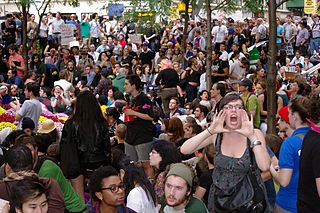Liberals tend to underestimate the amount of actual agreement among those who share their ideology, while conservatives tend to overestimate intra-group agreement, according to new research published in Psychological Science, a journal of the Association for Psychological Science.
These findings may help to explain differences in how political groups and movements, like the Tea Party and Occupy Wall Street, gain traction on the national stage:
“The Tea Party movement developed a succinct set of goals in its incipient stages and effectively mobilized its members toward large-scale social change quite quickly,” says psychological scientist Chadly Stern of New York University. “In contrast, despite its popularity, the liberal Occupy Wall Street movement struggled to reach agreement on their collective mission and ultimately failed to enact large-scale social change.”
Stern, with co-authors Tessa West and Peter Schmitt, recruited almost 300 hundred participants to complete an online survey. The participants read political statements (e.g., “In general, I support labor unions,”) and non-political statements (e.g., “I enjoy coffee”) and were asked to indicate whether they agreed or disagreed with each statement. They were also asked to indicate how much others of the same political persuasion would support their own attitudes – a measure of perceived in-group consensus.
Liberals showed what the researchers call “truly false uniqueness,” perceiving their beliefs as more divergent from the beliefs of other liberals than they actually were. Moderates and conservatives, on the other hand, showed evidence of “truly false consensus,” perceiving their beliefs to be more similar to those of other members of their political group than they actually were.
Data from a second study suggest that the relationship is driven by participants’ desire to feel unique: Liberals reported a stronger desire for uniqueness than did moderates or conservatives.
Surprisingly, these trends even emerged among nonpolitical judgments, such as preference for coffee: Liberals believed their preferences were more different from those of other liberals than they actually were, while conservatives believed their preferences were more similar to those of other conservatives than they actually were.
Given that perceptions of in-group consensus can be an important motivator for social change, these new findings may help to explain why liberal and conservative movements develop different political trajectories:
“Liberal social movements might struggle to develop solidarity and formulate shared goals within their ranks, both because liberals want to maintain unique beliefs and because they underestimate the amount of agreement among their members,” Stern explains.
“Conservative social movements might initially capitalize on perceiving agreement to galvanize their ranks, but their inaccurate perceptions could impair group progress when actual agreement is necessary.”




Hello Uncle B:
Must be very lonely with no one to investigate. You may investigate me, if you want to.
—- George Comer – 5774;003.016 ~14:09 PST
Canada an advanced country, and all Scandinavia, Germany and others, have Social Democratic parties, and often they form coallition governments or even take over leadership when necessary, to right social wrongs, give the nations a humane, peope oriented direction, even to quash the Uber Rich and their leverages(Caterpillar, Heinz,in Ontario) on the public purse that are to their own advantage and at the cost of the peon. (Lac Megantique) America’s stock markets broke all time records yesterday, while food stamps to the poorest were cut? Medical care for the masses(those that should generate the wealth of a nation) failed? This is counted as success? By what mystical logic? Well of course! The Great Corporate American Propaganda Whore’s distortions, “illusions”, scewings, impositions, even her constant moanings?